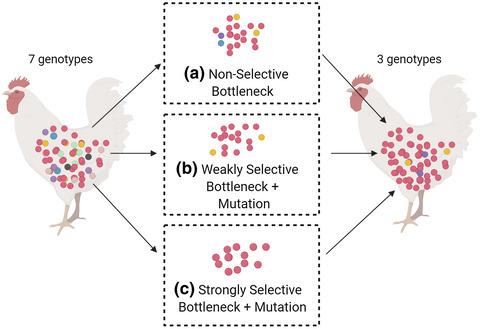当前位置:
X-MOL 学术
›
Mol. Microbiol.
›
论文详情
Our official English website, www.x-mol.net, welcomes your feedback! (Note: you will need to create a separate account there.)
Selective and non‐selective bottlenecks as drivers of the evolution of hypermutable bacterial loci
Molecular Microbiology ( IF 3.6 ) Pub Date : 2020-03-17 , DOI: 10.1111/mmi.14453 Megan De Ste Croix 1 , Jonathan Holmes 1 , Joseph J. Wanford 1 , E. Richard Moxon 2 , Marco R. Oggioni 1 , Christopher D. Bayliss 1
Molecular Microbiology ( IF 3.6 ) Pub Date : 2020-03-17 , DOI: 10.1111/mmi.14453 Megan De Ste Croix 1 , Jonathan Holmes 1 , Joseph J. Wanford 1 , E. Richard Moxon 2 , Marco R. Oggioni 1 , Christopher D. Bayliss 1
Affiliation

|
Bottlenecks reduce the size of the gene pool within populations of all life forms with implications for their subsequent survival. Here, we examine the effects of bottlenecks on bacterial commensal‐pathogens during transmission between, and dissemination within, hosts. By reducing genetic diversity, bottlenecks may alter individual or population‐wide adaptive potential. A diverse range of hypermutable mechanisms have evolved in infectious agents that allow for rapid generation of genetic diversity in specific genomic loci as opposed to the variability arising from increased genome‐wide mutation rates. These localised hypermutable mechanisms include multi‐gene phase variation (PV) of outer membrane components, multi‐allele PV of restriction systems and recombination‐driven antigenic variation. We review selected experimental and theoretical (mathematical) models pertaining to the hypothesis that localised hypermutation (LH) compensates for fitness losses caused by bottlenecks and discuss whether bottlenecks have driven the evolution of hypermutable loci.
中文翻译:

选择性和非选择性瓶颈是超可变细菌基因座进化的驱动力
瓶颈会减少所有生命形式的种群中基因库的大小,并对其后续生存产生影响。在这里,我们研究了瓶颈在宿主之间传播和传播过程中对细菌共病病原体的影响。通过减少遗传多样性,瓶颈可能会改变个人或整个人群的适应潜力。传染原已发展出多种多样的高变机制,可在特定基因组位点快速产生遗传多样性,而不是因全基因组范围内的突变率增加而引起的变异性。这些局部的超可变机制包括外膜成分的多基因相变(PV),限制系统的多等位基因PV和重组驱动的抗原变异。
更新日期:2020-03-26
中文翻译:

选择性和非选择性瓶颈是超可变细菌基因座进化的驱动力
瓶颈会减少所有生命形式的种群中基因库的大小,并对其后续生存产生影响。在这里,我们研究了瓶颈在宿主之间传播和传播过程中对细菌共病病原体的影响。通过减少遗传多样性,瓶颈可能会改变个人或整个人群的适应潜力。传染原已发展出多种多样的高变机制,可在特定基因组位点快速产生遗传多样性,而不是因全基因组范围内的突变率增加而引起的变异性。这些局部的超可变机制包括外膜成分的多基因相变(PV),限制系统的多等位基因PV和重组驱动的抗原变异。



























 京公网安备 11010802027423号
京公网安备 11010802027423号